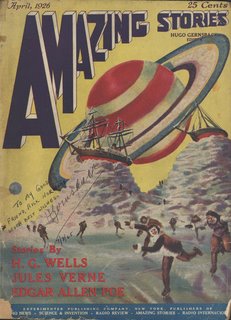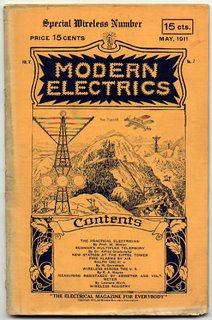My roots in reading are mostly in the science fiction genre. My older brothers were SF readers and I was introduced to the writings of Asimov, Clarke and Heinlein at a very early age. I took it much further than they did and I read hundreds of SF books. The ones I loved the most were from what is known as The Golden Age of Science Fiction.
The Golden Age is generally considered to have started in the late 1930’s and ran up to about the year 1960. The one individual that is credited more than any as the instigator of that renaissance period was John W. Campbell. Campbell took over the editorial reigns of Astounding Stories (which he renamed Astounding Science Fiction) in 1938, after working as an assistant for about a year. Campbell was a hands-on editor, notoriously so in some cases, but his acute eye for material and his vision of what direction the field should go in had a greater influence than perhaps anyone else in the history of science fiction.
I also liked a lot of the pulp era fiction that preceded The Golden Age. Much of it was what some call Space Opera, not a lot different than a cowboys and Indian yarn with space suits and rockets instead of a tall hats and horses. But there was an unbridled energy and optimism in the best of the Scientifiction of the 1920’s.
 The man responsible for bringing the first magazine that regularly published science fiction was Hugo Gernsback. In 1908, Gernsback created the first magazine dedicated to electronics, called Modern Electrics, which printed fiction in its pages. After various other publishing efforts, Hugo Gernsback unleashed the first magazine fully dedicated to science fiction: Amazing Stories.
The man responsible for bringing the first magazine that regularly published science fiction was Hugo Gernsback. In 1908, Gernsback created the first magazine dedicated to electronics, called Modern Electrics, which printed fiction in its pages. After various other publishing efforts, Hugo Gernsback unleashed the first magazine fully dedicated to science fiction: Amazing Stories.
Gernsback, in addition to being known as the Father of Science Fiction, also instigated what was later called fandom, by printing addresses of those that wrote to Amazing Stories. Enthusiastic readers began writing feverish letters to each other and in time started publishing their own amateur fanzines.
Hugo Gernsback also wrote his own fiction, most notably a novel called Ralph 144C 41+, but it was turgid stuff and he is mostly remembered as an editor. Many came to despise him, as his policy seemed to be to pay writers only as a last resort. This seems to be a heinous practice, but all lovers of science fiction owe the man a debt. The world of imaginative fiction would be far different had it not been for his efforts.
I’m reading a book now about the history of the science fiction genre. It’s called The Futurians and it is one of the most fascinating, hilarious and entertaining books I’ve ever read. The Futurians were a group of fanatical science fiction enthusiasts that formed in 1938. Members of went on to become some of the most influential and celebrated writers and editors of the science fiction genre. Frederik Pohl, Donald A. Wollheim, Isaac Asimov, C.M. Kornbluth, Judith Merrill and James Blish among others were members. The Futurians book was written by one of its own, Damon Knight, who imbues his historical account with impish glee.
The Futurians were a remarkable group of individuals. By turns this book is wildly hysterical, sad, moving, shocking and obscene. Dirt poor and surviving by their wits, there were always dissent between rivaling factions, all of which were detailed in the numerous fanzines the group published and distributed. In the small world of SF fandom, they make stars of themselves and bit by bit, they became the professionals in the field that they knew they would eventually be. It’s a profound story of the search for one’s dreams and this motley group, that were often dirty, deranged and ill-mannered, found theirs.
More than just a writers’ support group, The Futurians often lived together and were like a family. And as with all other families, there were huge altercations, betrayals and often downright hatred. But there was also a great deal of affection and loyalty.
Published in 1977, I read The Futurians when I was 16 years old. I was moved by it and it made me jealous. I wished that I had been born back in the time that is known as First Fandom. Shortly after I heard that there was a local science fiction organization in my town and I was thrilled. I contacted them and went to my first meeting with great excitement. That excitement was short-lived, as I found the group to be silly, trivial and boring. Nothing like the kind of group I’d want to be a member of.
Clearly fandom had gone in a different direction as the decades went on. And it’s gotten even worse today. Much worse.
Last night I was in Barnes and Noble. Drinking a green tea, I perused the science fiction section. What I found there was complete depression.
Yes, there were some books by Frederik Pohl. Dick is more popular today then when he was alive. Heinlein continues to be discovered by new generations and for that I am grateful. Asimov can be found and so can Clarke. Frank Herbert too, but I’ve never been a big fan of his work.
But what of C.M. Kornbluth? Alfred Bester? Cordwainer Smith? Murray Leinster? Clifford Simak? Edgar Pangborn? Lester Del Rey? Jack Williamson? C.L. Moore? Algis Budrys? Eric Frank Russell? Henry Kuttner? Leigh Bracket? Avram Davidson? William Tenn? Poul Anderson? John Brunner? Stanley G. Weinbaum? Chad Oliver? Richard Wilson? L. Sprague DeCamp? Fritz Leiber? Damon Knight? John Wyndham? Nelson Bond? Heck, at this point I’m even feeling nostalgic about good old Mack Reynolds.
For the most part, the stuff on the shelves looks awful to me. The cover art is garish and tacky, looking like some kind of anime cartoon. That’s unfair, because I haven’t read many of the newer writers. I’ll give them the benefit of the doubt though, and say that they are all worthy of publication and acclaim. But what of the ones that created the genre? The pioneers that built the field with their guts and brains. They are being forgotten at a rapid pace. Many of them worked for starvation wages and were poverty-stricken in their so-called ‘golden age’.
I grew weary of science fiction in the early 80’s. I had read a hell of a lot of the older stuff, but the new writers just weren’t doing it for me. Hard SF was making it big and a lot of what was being marketed seemed to be Star Wars and Tolkien clones. I wanted something different and I made the switch from being a science fiction fan to a horror freak.
The 80’s were a great time to be a horror fan. In fact, I consider it to be the Golden Age of Horror. All manner of fiction was being published, from atmospheric to ultra violent. And as with the Golden Age of Science Fiction, I like just about everything that was being published. Well, maybe not the z-grade Pinnacle paperback originals and the like, but the stuff that was being published by the serious editors in the field.
I stuck with horror through the hard years of the 90’s and I still liked the majority of what I read. Even while I started reading a lot of suspense as well. I read very, very little SF in these years.
Now we’re approaching the second decade of the 21st Century. Like with science fiction of the 80’s the field is becoming too big. Fandom has become an enormous thing and everything but the kitchen sink is being published and touted as being brillia
nt. Looking around, the horror community isn’t as comfortable and constructive as I once saw it to be. And the old science fiction classics are calling me back.
It has been decades since I read most of the great fiction from The Golden Age of Science Fiction. I miss it and it has been just about long enough ago that I need to go back. Re-read it and remember the awe and wonder I felt as a child. Will it hold up? Some, undoubtedly, will not. But I think that a lot of it will.
Don’t worry. I’m not abandoning horror and I’ll continue to read it, watch it and comment on it. And maybe in fifteen or twenty years I’ll be yelling at all the young whippersnappers for neglecting the classic horror fiction from the70’s, 80’s and 90’s.
9 Comments
Linear